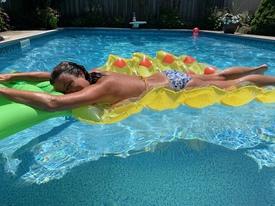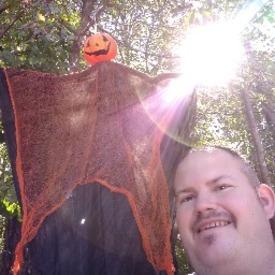Tell me again why eating before bed won't make me fat?

karenhray7
Posts: 219 Member
I'm not talking about a glass of milk or a small snack here. I'm talking to the people who believe that it doesn't matter when you eat your calories. I get that your body can't distinguish time and doesn't care when it gets food, but if a person eats during the hours he/she is up and moving then there is a greater immediate need for kcal and less is stored for later use. But if a person eats and then goes to sleep?
Let's say Bob's BMR is 1600/24hr. Basic math would say that Bob would burn 66.67 kcal/hr while sleeping. If Bob has a 6 hour sleep cycle, he would burn 400kcal during those 6 hours. Right?
If basic biochem holds true, when Bob eats, his body will use whatever kcal it needs to meet its immediate energy requirements and store the rest for later use. Yes?
Holding these first two statements to be true, if Bob eats 1200kcal of Ben and Jerry's while watching the Biggest Loser and then immediately goes to bed, how are the extra 800kcal used? Because if they're not used, they're stored. Right? And if only so many kcal go to replenish glycogen stores, what about the rest?
Discuss...
Let's say Bob's BMR is 1600/24hr. Basic math would say that Bob would burn 66.67 kcal/hr while sleeping. If Bob has a 6 hour sleep cycle, he would burn 400kcal during those 6 hours. Right?
If basic biochem holds true, when Bob eats, his body will use whatever kcal it needs to meet its immediate energy requirements and store the rest for later use. Yes?
Holding these first two statements to be true, if Bob eats 1200kcal of Ben and Jerry's while watching the Biggest Loser and then immediately goes to bed, how are the extra 800kcal used? Because if they're not used, they're stored. Right? And if only so many kcal go to replenish glycogen stores, what about the rest?
Discuss...
0
Replies
-
EATING BEFORE BED IS BAD!0
-
yes it is don't eat after u go bed I have done that let me tell you I pay for it the next day I see 1 to 2 lbs weight gain no good0
-
I'm not talking about a glass of milk or a small snack here. I'm talking to the people who believe that it doesn't matter when you eat your calories. I get that your body can't distinguish time and doesn't care when it gets food, but if a person eats during the hours he/she is up and moving then there is a greater immediate need for kcal and less is stored for later use. But if a person eats and then goes to sleep?
Let's say Bob's BMR is 1600/24hr. Basic math would say that Bob would burn 66.67 kcal/hr while sleeping. If Bob has a 6 hour sleep cycle, he would burn 400kcal during those 6 hours. Right?
If basic biochem holds true, when Bob eats, his body will use whatever kcal it needs to meet its immediate energy requirements and store the rest for later use. Yes?
Holding these first two statements to be true, if Bob eats 1200kcal of Ben and Jerry's while watching the Biggest Loser and then immediately goes to bed, how are the extra 800kcal used? Because if they're not used, they're stored. Right? And if only so many kcal go to replenish glycogen stores, what about the rest?
Discuss...
You're forgetting to account for what happens earlier in the day if Bob is eating his food at night.
Lets use an extreme example and eat all of our food before bed. Lets suppose we store some fat because we're not utilizing that energy.
During the day, Bob is not eating any food. He is oxidizing fat.
All that matters is the net difference between fat storage and fat oxidation. Given the same total calories, the more you eat at night the less you eat during the day. So fat oxidation is blunted at night and fat storage increases, but fat storage goes down during the day and fat oxidation increases.
The net difference is governed by energy balance.
Essentially this is why it really doesn't make a difference.0 -
if he's eating at maintenance or at a deficit, those calories would still get used later. it may not be in their most immediate form; they may be taken out of fat stores. just because it doesn't get used immediately doesn't mean it's not getting used at all.0
-
it will. we only burn about 65 calories an hour while sleeping0
-
So let's say in a 24 hour period you burn 2200 calories.
And let's say within that 24 hour period you eat 1700 calories (suppose you at 700 of them in bed).
What is 2200 - 1700?0 -
Seems most say if you go to bed between 10pm-12 midnight then you shouldn't eat anything after say 9pm, But I do, I always have and always will, I eat all my snacks between 9pm and 1130, I know I should stop but I can't.
I have try to pick better things to eat at night and don't eat as much0 -
I think it is better to eat dinner earlier than right before bed but my schedule doesn't allow it. I eat dinner around 9-10 pm almost daily and I'm still losing weight. You can still lose weight if you eat less calories than your TDEE.0
-
You need to extend your timeframe to account for the entire day.0
-
If there is going to be math can we at least use a 24 hour day? This stored energy Bobby packed away while he was sleeping, might it be put to use the next day since he is eating in a calorie deficit?0
-
I always eat right before sleeping. Full stomach puts me to sleep.0
-
I'm not talking about a glass of milk or a small snack here. I'm talking to the people who believe that it doesn't matter when you eat your calories. I get that your body can't distinguish time and doesn't care when it gets food, but if a person eats during the hours he/she is up and moving then there is a greater immediate need for kcal and less is stored for later use. But if a person eats and then goes to sleep?
Let's say Bob's BMR is 1600/24hr. Basic math would say that Bob would burn 66.67 kcal/hr while sleeping. If Bob has a 6 hour sleep cycle, he would burn 400kcal during those 6 hours. Right?
If basic biochem holds true, when Bob eats, his body will use whatever kcal it needs to meet its immediate energy requirements and store the rest for later use. Yes?
Holding these first two statements to be true, if Bob eats 1200kcal of Ben and Jerry's while watching the Biggest Loser and then immediately goes to bed, how are the extra 800kcal used? Because if they're not used, they're stored. Right? And if only so many kcal go to replenish glycogen stores, what about the rest?
Discuss...
You're forgetting to account for what happens earlier in the day if Bob is eating his food at night.
Lets use an extreme example and eat all of our food before bed. Lets suppose we store some fat because we're not utilizing that energy.
During the day, Bob is not eating any food. He is oxidizing fat.
All that matters is the net difference between fat storage and fat oxidation. Given the same total calories, the more you eat at night the less you eat during the day. So fat oxidation is blunted at night and fat storage increases, but fat storage goes down during the day and fat oxidation increases.
The net difference is governed by energy balance.
Essentially this is why it really doesn't make a difference.
THISSSSSSSS. The reason the whole myth of "eating before bed is bad" came about is b/c most people who were doing this were eating normally throughout the day and then eating lots of extra calories before bed. Yes, doing this, you will probably gain weight. However, if you eat at a number of calories that puts you in a deficit, IT WILL NOT MATTER WHEN YOU EAT THEM.0 -
It's fine because bob's day is a whole 24 hrs, not just the 6 hours he's sleeping plus however long it took him to down the Ben & Jerry's. As long as Bob maintains a deficit over his whole 24 hour day (give or take), it's fine. If you assume the "extra" calories are stored, then presumably, the extra energy his body needed early (but weren't consumed until later) would have been taken from those stores. The "extra" calories would replenish the stores, but assuming he kept a deficit, the stores would be replenished with less than they started with. Idk-I'm making that part up, but I eat most of my calories within an hour of bed, and my fat seems to find a way to go away.0
-
I eat literally in bed every night. I take a snack to bed with me cos I'm a piggy like that. My body obviously hasn't realised that I'm doing a bad bad thing....It doesn't seem to care...funny that. It doesn't just stop working while it's sleeping.0
-
So let's say in a 24 hour period you burn 2200 calories.
And let's say within that 24 hour period you eat 1700 calories (suppose you at 700 of them in bed).
What is 2200 - 1700?
I think you're missing the point. The body doesn't burn kcal at a steady rate. Even if Bob burns 2200 kcal in a 24hr period and only consumes 1000 during his day, giving the body more kcal than it NEEDS at any one time will result in storage. Even if Bob eats his ice cream in the middle of the day, any excess kcal will be stored for later use. And once the immediate energy needs are met and glycogen has been replenished, how are the extra kcal not stored as fat?0 -
calories in, calories out. Doesn't matter when you consume these calories as long as you burn them.0
-
Because math.0
-
So let's say in a 24 hour period you burn 2200 calories.
And let's say within that 24 hour period you eat 1700 calories (suppose you at 700 of them in bed).
What is 2200 - 1700?
I think you're missing the point. The body doesn't burn kcal at a steady rate. Even if Bob burns 2200 kcal in a 24hr period and only consumes 1000 during his day, giving the body more kcal than it NEEDS at any one time will result in storage. Even if Bob eats his ice cream in the middle of the day, any excess kcal will be stored for later use. And once the immediate energy needs are met and glycogen has been replenished, how are the extra kcal not stored as fat?
I believe it's you who are missing the point.0 -
your body burns cals 24 hours a day. Calories are energy your body needs energy to do things like say. pump your heart, digest food while sleeping, keep your brain active, you know lil things like that.0
-
calories in, calories out. Doesn't matter when you consume these calories as long as you burn them.
I think this answers the question.0 -
So let's say in a 24 hour period you burn 2200 calories.
And let's say within that 24 hour period you eat 1700 calories (suppose you at 700 of them in bed).
What is 2200 - 1700?
I think you're missing the point. The body doesn't burn kcal at a steady rate. Even if Bob burns 2200 kcal in a 24hr period and only consumes 1000 during his day, giving the body more kcal than it NEEDS at any one time will result in storage. Even if Bob eats his ice cream in the middle of the day, any excess kcal will be stored for later use. And once the immediate energy needs are met and glycogen has been replenished, how are the extra kcal not stored as fat? 0
0 -
dinner...bad bad....
a snack or small meal under 300 cal.. OK...
but i never eat a meal of any size after 6pm (except on rare event occasions of course) and i usually just do a snack size meal for dinner, if that.
dinner KILLS my weight loss... just kills it.0 -
I often have a snack late at night (because I am often up late and get hungry), so I try to keep it small. If I really want something sweet, I'll have a small handful of chocolate chips to satisfy the sweet tooth. Even if it is not the absolute healthiest, I do the best I can and am doing well on my journey so far. That said, I think it's okay to have a small snack before bed but ya can't get upset if the weight fluctuates in the morning (especially because weight fluctuation is totally normal and probably would have happened even without the small snack).
Enjoy 0
0 -
Here is a summary about the reality of night time eating from a bodybuilder with a PHd in Nutritional sciences.
http://www.biolayne.com/nutrition/carbs-at-night-fat-loss-killer-or-imaginary-boogeyman/0 -
But, you know what would make it even worse? If Bob doesn't eat breakfast. Then his metabolism wouldn't restart after sleeping. So now he stored all those calories that he ate right before bed AND he left his metabolism stopped, too!
I just figured that would add in another myth and make Bob's situation even more disastrous. :bigsmile:0 -
Hmm well I always eat right up until I go to sleep! As you can see from my ticker, it hasn't stopped me :P0
-
Scenario 1:
I'm awake for 16 hours and burn 2000 calories. I sleep 8 hours and burn 300 calories. Total calories burned for the day 2300. I eat 1 1800 calorie meal for the day right before I go to sleep. How many calories did I burn in that day?
Scenario 2:
I'm awake for 16 hours and burn 2000 calories. I sleep 8 hours and burn 300 calories. Total calories burned for the day 2300. I eat 6 300 calorie meals spaced evenly apart throughout the day. Total calories eaten for the day is 1800 calories. How many calories did I burn in that day?0 -
Fun shenanigans between bed and sleep.0
-
So let's say in a 24 hour period you burn 2200 calories.
And let's say within that 24 hour period you eat 1700 calories (suppose you at 700 of them in bed).
What is 2200 - 1700?
I think you're missing the point. The body doesn't burn kcal at a steady rate. Even if Bob burns 2200 kcal in a 24hr period and only consumes 1000 during his day, giving the body more kcal than it NEEDS at any one time will result in storage. Even if Bob eats his ice cream in the middle of the day, any excess kcal will be stored for later use. And once the immediate energy needs are met and glycogen has been replenished, how are the extra kcal not stored as fat?
They will be. And then the next day, when he is not eating as is moving, the fat will be oxidized. Net cals.0 -
I have been eating my supper most nights around 8-9pm for the last 2 years and I have lost 80+ pounds....it still works.0
This discussion has been closed.
Categories
- All Categories
- 1.4M Health, Wellness and Goals
- 398.3K Introduce Yourself
- 44.7K Getting Started
- 261K Health and Weight Loss
- 176.4K Food and Nutrition
- 47.7K Recipes
- 233K Fitness and Exercise
- 462 Sleep, Mindfulness and Overall Wellness
- 6.5K Goal: Maintaining Weight
- 8.7K Goal: Gaining Weight and Body Building
- 153.5K Motivation and Support
- 8.4K Challenges
- 1.4K Debate Club
- 96.5K Chit-Chat
- 2.6K Fun and Games
- 4.7K MyFitnessPal Information
- 17 News and Announcements
- 21 MyFitnessPal Academy
- 1.5K Feature Suggestions and Ideas
- 3.2K MyFitnessPal Tech Support Questions




















